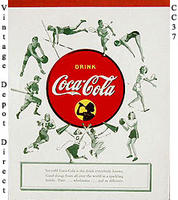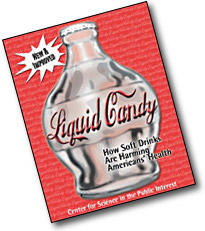 I don't neccessarily have an opinion about soft drinks in school vending machines, OK? And if I did there wouldn't be much I could do about it. But lots of other people do. And can. People such as school principals and schools superintendents and school board members. People who have the power to ban soft drink vending machines from their schools altogether as a way to stop kids from getting even fatter than they already are, since fat kids are in danger of developing type 2 diabetes or even double diabetes. And, no, I'm not making double diabetes up.
I don't neccessarily have an opinion about soft drinks in school vending machines, OK? And if I did there wouldn't be much I could do about it. But lots of other people do. And can. People such as school principals and schools superintendents and school board members. People who have the power to ban soft drink vending machines from their schools altogether as a way to stop kids from getting even fatter than they already are, since fat kids are in danger of developing type 2 diabetes or even double diabetes. And, no, I'm not making double diabetes up.Anyway, schools across the nation have already banned sugar laden drinks and snacks from being dispensed from school machines--I know because I wrote about it when I was an education reporter. Sometimes the school powers that be remove the machines completely. Sometimes they replace the soft drinks with milk. The soft drink companies don't like either choice very much. Nor does their lobbying arm, the American Beverage Association.
So what does the trade group do? It comes up with its own policy, which gives the appearance that the group is doing the right thing by promoting a healthy lifestyle but is really aimed at protecting one of its members' most valuable markets: maleable mini-consumers who have not yet developed lifelong brand loyalty, who are a captive audience, and who have lots of pocket change to burn.
Here's the policy:
* Elementary students get water and 100% juice.
* Middle schoolers get water, juice, sports drinks, no-calorie soft drinks, and low-calorie juice drinks. Full-calorie soft drinks and juice will only be dispensed from vending machines after school.
* In high school, almost anything goes, including full-calorie soft drinks and juice, though they won't make up more than 50% of the choices.
Do you see it? Do you see the mad genius behind this policy?
What they've done is made their products forbidden full-calorie fruit, as it were. They've added more mystique and allure to a can of Coke or Pepsi than 100 athletes, comedians, supermodels, singers, or Spice Girls could. Because only the cool older kids are allowed to drink them. And middle-schoolers only get a little taste, after school. Just enough to get hooked. By the time these kids hit high school they'll be jonesing for the juice and cola.
And do you think it is magnanimous of the soft drink companies to agree not to market to the very youngest consumers? Think again: both juice (such as Minute Maid) and water (such as Dannon and Dasini) are made by soft drink companies. Milk, on the other hand, is not made by soft drink companies. Notice that the soft drink industry's policy never mentions the m-word.
 Besides, it's not like the average elementary school-age student gets a huge allowance.
Besides, it's not like the average elementary school-age student gets a huge allowance.My favorite line from this Reuters story about the policy: "The American Beverage Association said it asked companies and school districts to make changes as soon as possible."
Well, duh. Of course they did. The alternative was this.
.

No comments:
Post a Comment